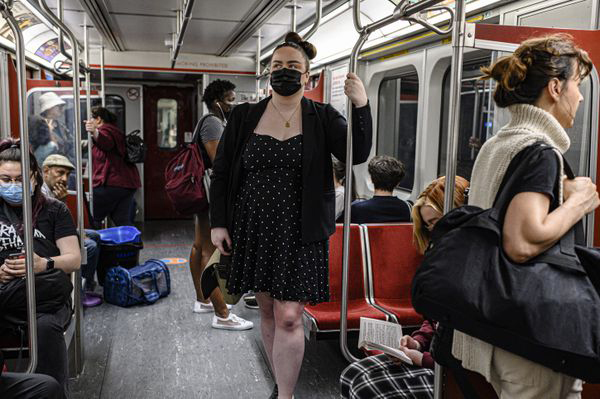This post is also available in: 简体中文 繁體中文

Larissa McKnight wasn’t prepared for the horde as she walked toward work at Toronto’s Yonge-Dundas Square, still wearing her mask just after getting off the subway.
Ms. McKnight, a 27-year-old marketing manager, had unwittingly headed straight into an anti-masking protest held late last month. Feeling alone in the crowd, she avoided eye contact. Then a man with a megaphone came at her, blaring demands that she take off the mask, yelling that mandates were over.
“I immediately started feeling anxious and panicky,” said Ms. McKnight, who has suffered from severe asthma and continues masking in crowded, indoor spaces to protect herself and others from COVID-19. Later, she felt angry at the “hypocrisy” of the encounter: “They are fighting for autonomy to not be forced to wear a mask, yet they are insisting I remove one.”
It wouldn’t be the only antagonism over her mask. Some of Ms. McKnight’s online gaming friends derided her as a “sheep” and “snowflake” after she shared a masked selfie over their group chat. “It was disappointing from people I considered my friends,” she said.
As mask and vaccine mandates expire and more Canadians turn their attention away from COVID-19, those who continue to mask in public are a shrinking minority. Some find themselves glared at in grocery stores or questioned by strangers on the street. Others get harassed on the job for masking, particularly in the service industry. Some describe their kids being teased for keeping their masks on in class.
What we are witnessing, experts say, is a total inversion of social norms around masking, with those who continue covering up increasingly feeling like outsiders forced to justify their behaviour in public.
“The pressure is just so profound to not be the odd one out. It’s a real issue,” said Maxwell Smith, a Western University bioethicist who studies the ethical dimensions of how people respond to infectious diseases.
“It’s incredibly disappointing,” Dr. Smith said. “That person who gets vilified in the grocery store, they’re still wearing their mask because it’s strongly recommended. They’re following good advice to keep themselves and others safe.”
Some maskers who are confronted ignore the questioning; others respond with a “live and let live” approach. Some explain they have immunocompromised relatives to protect, or work in health care. Others take it to the level of performance art, removing their masks and faking a coughing fit – feigning they have COVID-19.
Infectious diseases physician Lynora Saxinger is concerned the confrontations may dissuade some from staying the course on masking.
“Many people just go with the flow and they might not have the will or extra fortitude needed to be a minority, especially if there’s implicit risk of someone getting in your face about the mask,” said Dr. Saxinger, a University of Alberta professor of medicine.
Dr. Saxinger described a scene in Calgary where a colleague and her preschooler were accosted as they left one store and were about to enter another, leaving their masks on momentarily outdoors.
“A man shouted at them on the street. If that’s a sign of things to come, that’s not very good,” Dr. Saxinger said. “That small vocal minority of people who are anti-mask to the point of being intrusive seems to be getting more emboldened” as restrictions are peeled back, she added.
:format(jpeg)/cloudfront-us-east-1.images.arcpublishing.com/tgam/C67UVNSINFAJ5D3Q4COKDCODEI.JPG)
Farhaan Hussain said he and his wife, a registered nurse, regularly attract eyeballs when grocery shopping masked.
“Costco, we see so many people without masks. We get stared at,” said Mr. Hussain, a 29-year-old Amazon employee in Dundas, Ont.
“I’m playing out scenarios in my mind, just in case someone comes and says something to me. … It’s very unnerving. It’s so unnecessary, a waste of time and energy.”
Despite the unwanted attention, Mr. Hussain continues masking at work, stores, malls and the common spaces at restaurants, though the couple mostly does takeout, not dine-in.
“My wife is responsible for her patients and co-workers. If I ever catch the virus and give it to her and she goes to work that’s a serious problem,” Mr. Hussain said.
He believes confrontational anti-maskers view the face coverings as symbols of a pandemic they’ve long sought to forget.
“They look at us in a way like we’re supporters of that same government that was imposing these ‘unnecessary’ rules,” Mr. Hussain said. “People who wear masks, we’re like remnants of that oppressive government. I feel like I should get a T-shirt: ‘I choose to wear my mask willingly.’ I choose to wear it because I see how COVID affects people.”
As he considers the current hostilities, Dr. Smith argued, “No one’s wearing a mask all day long to upset other people or virtue signal. …No one likes wearing it.”
The bioethicist isdismayed that so many Canadians viewed the end of official masking mandates as licence to abandon masks altogether, despite public health recommendations to continue masking indoors. “There are still many who, despite being two years into the pandemic, haven’t come to understand the benefits of two-way masking,” he said.
Looking ahead to the very real possibility of another COVID-19 surge in the fall, Dr. Smith argued that public health messaging needs to be highly specific if there is any hope it will pierce people’s profound fatigue with the virus. He urged messaging that focuses on protecting familiar people, such as elders, and more education on the prevalence and severity of long COVID.
“You don’t know who the people around you are. You could be on the bus next to someone who is severely immunocompromised. They might take every measure to stay healthy but they need other people to help them. That’s the story of public health.”
Article From: The Globe and Mail
Author: ZOSIA BIELSKI

